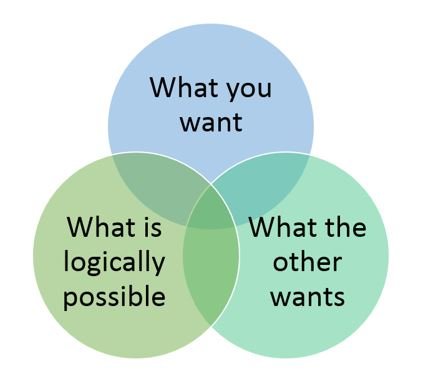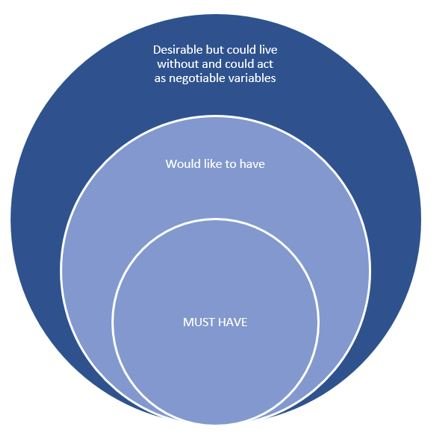How to Negotiate Properly
How to Negotiate Properly
In order to negotiate properly, you need to identify three things:

- Exactly what you want.
- What the other person wants.
- What is logically possible.
Look at the small intersection that satisfies all three sets.
This is where you will find your negotiated solution.
Notice how small the negotiated solution is, when compared to the whole model.
The negotiated solution represents a severely restricted set of circumstances; and that is why a negotiated settlement is sometimes difficult to find.
This diagram suggests three common negotiation errors:
- Trying to get everything YOU want, without giving much regard to what the other party wants, (The "Crush your enemy" approach to negotiation).
- Giving too much away to the other person, in the hope they will be nice to you in return, ("The Supplicant" - Theresa May's - approach to negotiation).
- Ignore the reality of the situation; and create a fantasy, make-believe solution that pleases both parties but cannot be implemented in practice, ("The Wishful thinking", approach to negotiation).
Please note these three common errors and avoid them.
Success in negotiation requires that you make careful preparations. You will perform better in negotiations, if you are well prepared.
Preparation includes analysing the three fields listed above, starting with the first field, "what you want".
The "what you want" field can be broken into three sub-sets.
- What you MUST have.
- What you would like to have.
- What is desirable, but what you could live-without and therefore could act as a "negotiable variable". (A negotiable variable is a factor that you can add to the negotiation to make your proposition more attractive to the other person, without damaging your own self-interest).

1. What you must have.
This means what it says. These are the major elements that you consider essential. You cannot agree to any situation which omits these major elements.
2. What you would like to have.
These are NOT major elements. These are factors that are important to you, but are not essential to your well-being and therefore do not fall into the first category.
3. What is desirable but what you could live without and could act as a "negotiable variable".
These are the many minor desirable items which you could forego, in exchange for a concession from the other side.
It is very important that you list all the things you want, but could live without, and therefore could trade as negotiable variables.
Prepare a list of negotiable variables.
Remember what a negotiable variable is. It is a factor that you can add into the equation (or one that you can remove) in order make your proposition more attractive to the other person without damaging your own self-interest.
The ideal is to have a nice long list of negotiable variables that are perceived as high value to the other person, but they are of low cost to you to provide.
4. To be super-successful, more preparation is required.
To the degree possible, try to predict the same three sets from your opponent's perspective. What things do you think your opponent:
- Must have?
- Would very much like to have?
- Could easily give away?
If you can pre-empt their thinking in these matters, then you have a greater chance of finding a beneficial negotiated settlement.
5. Finally, identify any logical constraints.
Identify what is NOT possible.
Everything has limits, including the negotiated solution.
You need to know what are the constraints imposed upon both parties?
- What are the practical constraints?
- What are the legal constraints?
- The time constraints?
- The company-policy constraints?
- The moral constraints? We think about the moral constraints because we want to be nice people.
Learn about all the above skills and more, on our one-day Negotiation Skills Training Course which we can deliver at your premises.
Definition: Negotiable variable
In business negotiation, a negotiable variable is an item you can add or remove from the deal. It feels valuable to the other side, costs you little, keeps your must-haves safe, and helps both sides move closer to agreement.
Show CG4D Definition
- Under your control to give or hold back
- Perceived as high value by the other party
- Low cost or risk to your own aims
- Used to close the gap and reach a deal
Article Summary
Great negotiators do three things: they pin down what they must have, learn what the other side needs, and respect the real limits of the deal. When you map these sets before the talk and list swap items that cost you little but feel rich to them, you avoid the crush-your-enemy, give-too-much and wishful-thinking traps, and you turn a clash into a win-win result.
Frequently Asked Questions
Here are some questions that frequently get asked about this topic during our training sessions.
Why is preparation vital before any negotiation?
How do I decide my must-have items?
What makes an item a good negotiable variable?
How can I predict the other party’s needs?
What are common negotiation mistakes to avoid?
Why is the negotiated solution often hard to find?
Which limits should I map before talks start?
Thought of something that's not been answered?
Did You Know: Key Statistics
The 2024 LinkedIn Workplace Learning Report shows that UK job posts asking for negotiation and persuasion skills have risen by 38% since 2020. A 2023 Harvard Business Review Analytic Services study found that firms that gave staff formal negotiation training gained an average 7% higher profit margin on deals compared with firms that did not.Blogs by Email
Do you want to receive an email whenever we post a new blog? The blogs contain article 5-10 minutes long - ideal for reading during your coffee break!
Further Reading in Communication - Persuasive Communication
-
How to Improve my Negotiation Skills
Learn negotiation skills that turn talks into win-win agreements. Get clear prep steps, active listening tips and training to improve negotiation success.
Read Article > -
Why are Some People Dangerous?
Learn how to spot dangerous speakers who sound inspiring but push irrational ideas. Use five logical test questions to protect yourself with rational thinking.
Read Article > -
Customer Service Training
Customer service training turns first impressions, polite words and need-focused help into loyal buyers and referrals. Boost trust and sales, avoid costly –
Read Article > -
Four Magic Phrases to Use Every Day
Discover four polite phrases that boost professional communication. Make clear requests, show thanks, question with respect and decline with grace daily.
Read Article > -
Good and Bad Speech Habits
Learn how speech habits sway your image and pay. Spot four common bad habits, swap in clear, polite language, and watch your career and workplace ties grow.
Read Article >
Looking for Communication Skills Training?
If you're looking to develop your Persuasive Communication Skills, you may find this Communication Skills Training Course beneficial:
Open Training Course Pricing and Availability
Next Open Course Starts in 5 days, Online - Teams, places available






